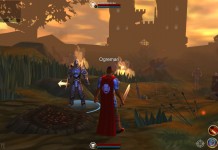
Actually, it’s a lot like Farmville injected with steroids sold by Sid Meyer’s Pirates. Personally, I’d love to see something like this for space empire simulations rather than naval warfare, but I’ll take it.
Picaroon is a free-to-play island-based colonial and naval MMORTS developed and published by Nice Technology Limited of Cambridge, UK. Initially, players are presented an island that they must colonize, develop, strip of resources, ramp production, and defend from attack. Game play flows from a build-over-time concept where building construction can take minutes to hours, and upgrades to existing buildings take exponentially longer each upgrade. Resources also flow in over time.
The game continues to play even when players aren’t logged in and the game world—a vast archipelago of islands—remains persistent over a long period of time. Picaroon is looking to offer three styles of gameplay: instant skirmishes, limited length games from days to months, and an eventual eternal-islands server.
Gameplay: Not only must you build up your holdings, you must hold the line

At first, buildings are simple. They represent the bare minimum of reaping the island for its resources: fishing huts and farms to gather food; forestry houses to chop down trees for wood; mines to reap rock and crystal from within the earth. After that it’s all about processing from mills to grind the food, foundries to smelt ore, and so on. Each tier requires a certain number of buildings already in the colony of particular levels to reach.
The final tiers also include tactical buildings that would protect the island from invaders—and there will be invaders—that run the gamut from siege cannon, fireship wharfs, and lens defenses (much like Archimedes’s death ray.) Enough of these buildings and a colony can repel attackers for quite some time on their own; but they’re not quite good enough to make up for a strong fleet.
Another extremely important building is the shipyard. Shipyards enable the construction of fleets of boats from cutters to bombers to the behemoth. The Behemoth is a monstrous ship-of-the-line with cannon useful for both attacking settlements and enemy ships.
Player-vs-Player: It’s all about the PvP

As fleets duke it out, some of the ships gain experience called Admiral Experience, which can be spent to build up their veteranship. Admirals in a fleet add bonuses to damage, firing rate, accuracy (and don’t they ever need better accuracy.) Of course, you’ll want to build huge fleets and that takes resources. Also, keep in mind, while you’re away your fleets just sit there and while they’re not sitting ducks, it does help if there’s a hand guiding them.
In game, there is a system for islands to join into alliances and empires.
This leads to a certain amount of diplomacy between players and is highly beneficial for all different types of players. Mostly this is useful because an alliance could have members who are online at different times, giving them the advantage of being able to continue strategic development and defense. It also means that if there’s a particularly heavily fortified island archipelago nearby, an alliance could collude in how they want to attempt to take it.
Generally, this happens to be one island at a time.
In my play through, I managed to join a relatively tight-knit alliance and got myself four islands. In the matter of two days (which I’d forgotten to play due to other obligations) a nearby colony rolled over me like a steamroller. Without me at the helm, I couldn’t direct my benefits or fleets to defend my islands and they just kept sending wave after wave of ships until my islands were but a smoldering ruin.
So it plays to actually pay attention and play daily in Picaroon and even that won’t always save a single island from destruction.
Fleet Battles: Naval supremacy is the way to go
The game doesn’t really have much in the way of blockades. That is, any island that you have can be attacked at any time sufficient a fleet that can reach it. So you really either need to picket a heavy fleet around an island or spend a lot on heavy defenses to make sure that attempting to take it is very, very slow. A well defended island can take hours to take apart, which gives you a lot more time to log in and see that something is going wrong.
Now, in game there are boons in the fashion of consumable “cards” called benefits. Some of these benefits can heavily reduce damage to a colony for a few minutes, up the rate of fire for static defenses, and the like. So, if you happen to log in while an enemy player is hammering one of your colonies, you can use one of your benefits to sink the opposing fleet or make your colony strong enough to absorb the shelling while one of your fleets comes in to repel the attackers or make them into reefs.

For those people who really want to annoy other players there’s even airships. Capable of bombing fleets and colonies, airships represent a serious danger as they move pretty quickly and can’t be targeted by certain unit types.
Freemium: The welcome wagon weapon of those with wads of cash
This is where Picaroon separates itself in the ethics school-of-thought for games that use the free-to-play freemium concept. The cash-for-credit system of the game happens to be called “Doubloons” (homage to the naval nature of the game, no doubt) and Doubloons are used to purchase specials. Specials are in-game benefits that players apply to themselves that last a certain period of time.
These boons cover a lot of ground from upping building speeds to becoming weapons against the enemy. Certain boons even give colonies immediate injections of resources or gold (useful if you’re just barely short on what you need for a new building.) There’s even packs of boons that are good for naval combat that increase damage, firing rate, reduce damage, etc.
The freemium system permits users to buy these boons, in packs, that they can then use in game. They directly change the game play in not-so-subtle ways, in fact. This means that a player with the money to spend on Doubloons with have thunderous advantage over a player who doesn’t. The idea is to allow people who don’t have a lot of time to play the game to make up for this by purchasing Doubloons. As the game continues to run even while people are asleep or at work, having less time to play means that players face a lot of time they’re vulnerable to attack.
Conclusion: The persistent game universe makes this an interesting tactical game
Picaroon can be a few hours of very OCD building adventure when it comes to its RTS foundations, but it shines most when it comes to the persistent nature. The fact that enemy colonies can sneak up and steal away your hard-built islands like a thief in the night can be frustrating, but it really lends a lot of reason to think long and hard about your defenses. It also means that you’ll want to spend at least an hour every day or more at various times watching and priming.
The graphics and sound are pretty solid and there’s a suitable help system to deliver the game and explain it. You may not do so well your very first game so pick one that’s only going to last a week, otherwise you’ll be stuck in a very long game where you’re constantly trying to rise out of your own ashes.
Pull into alliances quickly, but don’t rely on your allies for defense. The locations of islands is pretty random and enemies could skip your surrounding allies entirely and hit you without knowing they exist.
If you like RTS style games, this one does a pretty good job on balance and watching the boats fire at each other is pretty satisfying. Also, managing an empire of colonies can be quite relaxing for some. The game is still in beta right now and already I played in a classic beginner game with 136 other players. They weren’t that talkative, but if you post messages they’ll respond.
I can see definitely see a community of salty seafarers growing up around this game.
Now, if only I could roll my Farmville tractor over to the neighboring plot and bombard them with cannonfire…




















Captain Hoggard dropping a few words about the game! I’m a enthusiast for Picaroon! I’m a hardcore Picaroon player going casual. I would like to say that Picaroon is a great MMORTS game. First time I played it, I knew exactly what the purpose of the game was, how to build, what it takes to become a good player. I’m the creator and owner of the Picaroon Ventrilo Server. Ventrilo Service is free if your are playing Picaroon the game only. Decide to join Picaroon? Contact me on facebook at “Matthew Lamont Hurley” I will set you up with a registered member account for ventrilo, also decide to make a alliance? I can create your own password required channel!
Nice, thanks Captain Hoggard. I had a good time playing myself.
I can see how a real-time, persistent RTS would benefit hugely from coordination via Ventrilio. I didn’t have the benefit of any friends in game whilst I wrote up my review, but having that would certainly lend another dimension.
If you continue to play with us we can defiantly set you up! Great Review! Thank you for playing Picaroon!
Nicely reviewed – really accurate and I can tell you put a decent amount of time into the game, sometimes a rarity! Just want to point out though that the dev team behind Picaroon formerly produced Time of Defiance, a space-based game based on the same MMORTS model with small planets instead of islands. It only recently shut down after running for years, probably more than six. Picaroon is a huge improvement in gameplay and graphics though, ToD was great, but this is much more enjoyable. I wanted to mention this because this is just so much better, especially with the fact that you dont _need_ the premium stuff to do well… it just helps. I think the balance is great.
i dont like this mmo,so boring for me,graphic is bad too,dont like it
Decent mmo with a good graphic and good community,gameplay is interesting and I recommend this game everybody